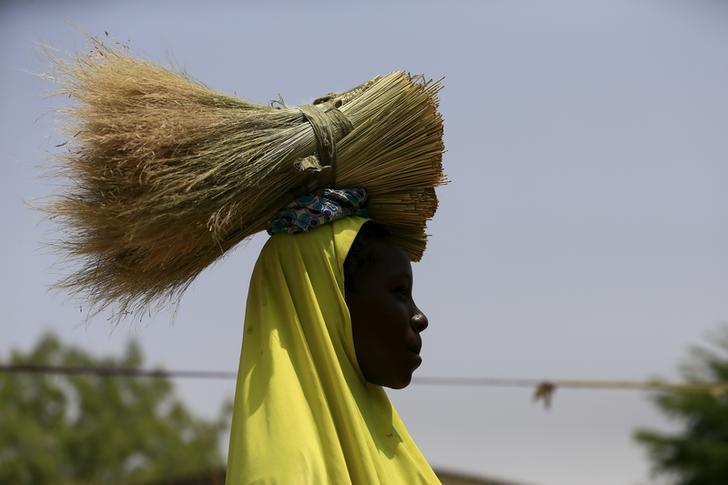A woman carries dried grass on her head in a community for internally displaced people in Maiduguri, Nigeria March 9, 2016. A Nigerian government push to strangle the Boko Haram insurgency has shut down the cattle trade that sustained the city of Maiduguri, leaving many residents with no livelihood, including many of the two million people displaced by the war.
The Nigerian military has been touting its recent successes against Boko Haram. Officials say many of the thousands of women and girls who'd been held hostage by the Islamist militant group have been freed.
But that's nowhere near the end of the story.
"There have been few joyous family reunions for these victims," writes the Washington Post's Africa bureau chief, Keven Sieff, in his recent story about women freed from the terror group's "rape camps."
His reporting focused on two young women kidnapped from the city of Bama, in northeastern Nigeria.
“For seven months, Hamsatu, now 25, and Halima, 15, were among Boko Haram’s sex slaves, raped almost every day by the same unit of fighters in the remote Sambisa Forest,” writes Sieff.
“They were just kept captive there in huts," Sieff explains. "They didn't know if they were going to be killed because they’d seen so many people shot at that point. Hamsatu tried to escape five times. Each time she was caught and brought back to her hut by Boko Haram guards and again violently raped.”
According to the young women’s accounts, the Nigerian military rescue operation that eventually came was incredibly violent. The military burned down a number of huts with the women still inside; soldiers were shooting wildly. Luckily Hamsatu and Halima survived and were taken by Nigerian soldiers to a camp for the displaced. (Sieff says the camp is nothing more than some abandoned buildings in the middle of the Nigerian desert, where the heat is scorching.)
But here’s where the story really stings. Not long after being freed from Boko Haram captivity, the women realized they weren't seen as victims. Instead, people viewed them as suspects or accomplices to the violence of their kidnappers.
Related story: A teen rescued from Boko Haram captivity still pines for her militant husband
The rationale for that attitude, says Sieff, is a prevailing belief that “after spending so much time with militants, after being raped by Boko Haram members, they’re seen as having a sort of bond or sort of sympathy for the terrorist organization, which is obviously very hard to understand.”
Another factor that serves to prejudice Nigerians against these survivors is the number of Boko Haram incidents involving female suicide bombers.
“In the last two years many, many women and girls have been used as suicide bombers in northeastern Nigeria. It’s not exactly known how they are coerced into doing that," says Sieff. “Some people say they’re drugged, some people say they're brainwashed, some people say they only have a choice of either being shot, or strapping themselves with explosives.”
Whatever the reasons, close to 50 percent of the suicide bombers in Nigeria last year were women, half of them under the age of 18. The unfortunate upshot is that “the Nigerian military, when they see female victims of Boko Haram, they immediately suspect, this woman, this girl could be a suicide bomber.”
Hamsatu and Halima, who go to group counseling every week for their trauma, are still treated that way by the wider community. "There’s almost no way that they can prove their innocence,” says Sieff.
The article you just read is free because dedicated readers and listeners like you chose to support our nonprofit newsroom. Our team works tirelessly to ensure you hear the latest in international, human-centered reporting every weekday. But our work would not be possible without you. We need your help.
Make a gift today to help us reach our $25,000 goal and keep The World going strong. Every gift will get us one step closer.
